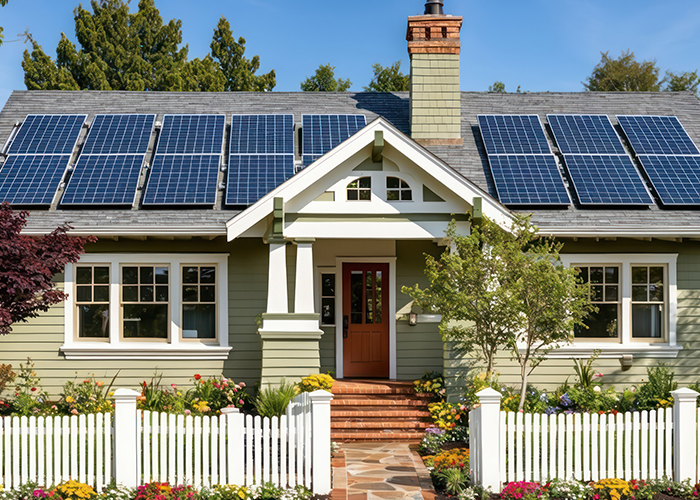Learn how solar panels for residential properties in Pitkin paired with battery storage can save money, boost efficiency, and provide backup power.

Did you know that homes with solar panels can now store energy fornight time use? In Pitkin, this combination is transforming the way people useelectricity. Installing residential solar panels for Pitkin along with ahome battery means you’re not just generating power, you’re controlling it.
How Residential Solar Panels for Pitkin Work
Residential solar panels for Pitkin capture sunlight andconvert it into electricity for your home. On sunny days, these panels often produce more power than you need. Traditionally, extra energy goes back to thegrid. But with a home battery, this surplus is stored for later use.
This stored energy is particularly useful in Pitkin County, where winter storms or cloudy days can interrupt the sunlight your panels rely on.Think of it as keeping a backup supply of electricity ready whenever you needit.
Why Add a Battery to Your Solar Panel for Residential Properties in Pitkin
A battery changes the game. Instead of relying on the grid duringthe night or outages, your home can run on stored solar energy. Here’s why itmatters:
· Energy Independence: Using a battery with your solar panel for residential properties in Pitkin reduces your reliance on utility power. You produce,store, and use your own energy, day or night.
· Lower Costs: By tapping into stored energy when electricity rates are high,you can save money on your monthly bills.
· Reliability: Storms or power outages no longer mean darkness or spoiled food. Batteries keep essentials running smoothly.
· Eco-Friendly Impact: Each kilowatt-hour from your battery lowers fossil fuel consumption, helping the environment.
Pickingthe Right Battery for Pitkin Homes
Choosing the right battery is essential. Consider:
· Capacity: How much energy can it store? Make sure it meets your home’s needs.
· Compatibility: Ensure it works well with your residential solar panels for Pitkin.
· Lifespan: Lithium-ion batteries typically last 10–15 years, while othertypes may need replacement sooner.
· Installation Support: Local installers know Pitkin’s building codes and can guide you on permits and setup.
Tips to Maximize Your Solar and Battery System
1. Keep panels clean: Dirt and debris reduce energy capture.
2. Monitor energy use: Track when to store or use electricity for maximum efficiency.
3. Schedule maintenance: Batteries and panels work best with regular check-ups.
4. Consider smart controls: Automation helps manage energy flow and can increase savings.
Pitkin-Specific Considerations
Pitkin County residents have access to incentives that make adding a battery more affordable. Holy Cross Energy offers rebates for energy storage systems, and state programs can provide additional support for renewable energy upgrades. These programs make it easier for home owners to pair residential solar panels for Pitkin with a battery system efficiently.
Take Control of Your Energy with SoL Energy
For homeowners in Pitkin, pairing residential solar panels for Pitkin with a home battery is easier with SoL Energy. Serving the Roaring Fork Valley since 2003, SoL Energy designs and installs solar panel systems for residential properties in Pitkin that are tailored to your home’s needs.
Their team handles everything, from system design and installationto helping you navigate local incentives, so you can start using clean,reliable energy without the hassle. With SoL Energy, your home isn’t justgenerating power; it’s storing it efficiently, saving you money, and helpingthe environment.
Ready to make the switch? Connect with SoL Energy today and see how your home can benefit from smart solar solutions.
Questions You Might Have
1. How long do home batteries last?
Home battery lifespan depends on type and usage. Lithium-ion batteriesusually last 10–15 years, while lead-acid batteries may last 5–7 years. Regular maintenance can extend their life.
2. Can batteries handle all my home’s energy needs?
Batteries are sized based on your home’s energy use. While they canpower essential appliances during outages, powering an entire home for severaldays may require multiple batteries.
3. How do I maintain my solar and battery system?
Regular maintenance includes cleaning solar panels, checking battery health, and ensuring all components are functioning correctly. Professional inspections can help identify and address potential issues before they become significant problems.
4. Can I monitor my system's performance remotely?
Yes, many modern solar and battery systems come with monitoring capabilities that allow you to track energy production, storage levels, and consumption patterns via smartphone apps or web portals.
5. Can I go off-grid in Pitkin County?
Yes, off-grid solar is legal in Colorado, including Pitkin County. However, permits are still required, and you'll need to follow local building and electrical codes. Work with licensed professionals who know the rules and local terrain.